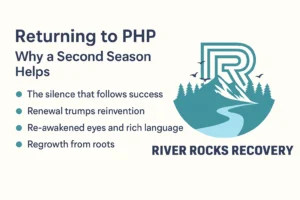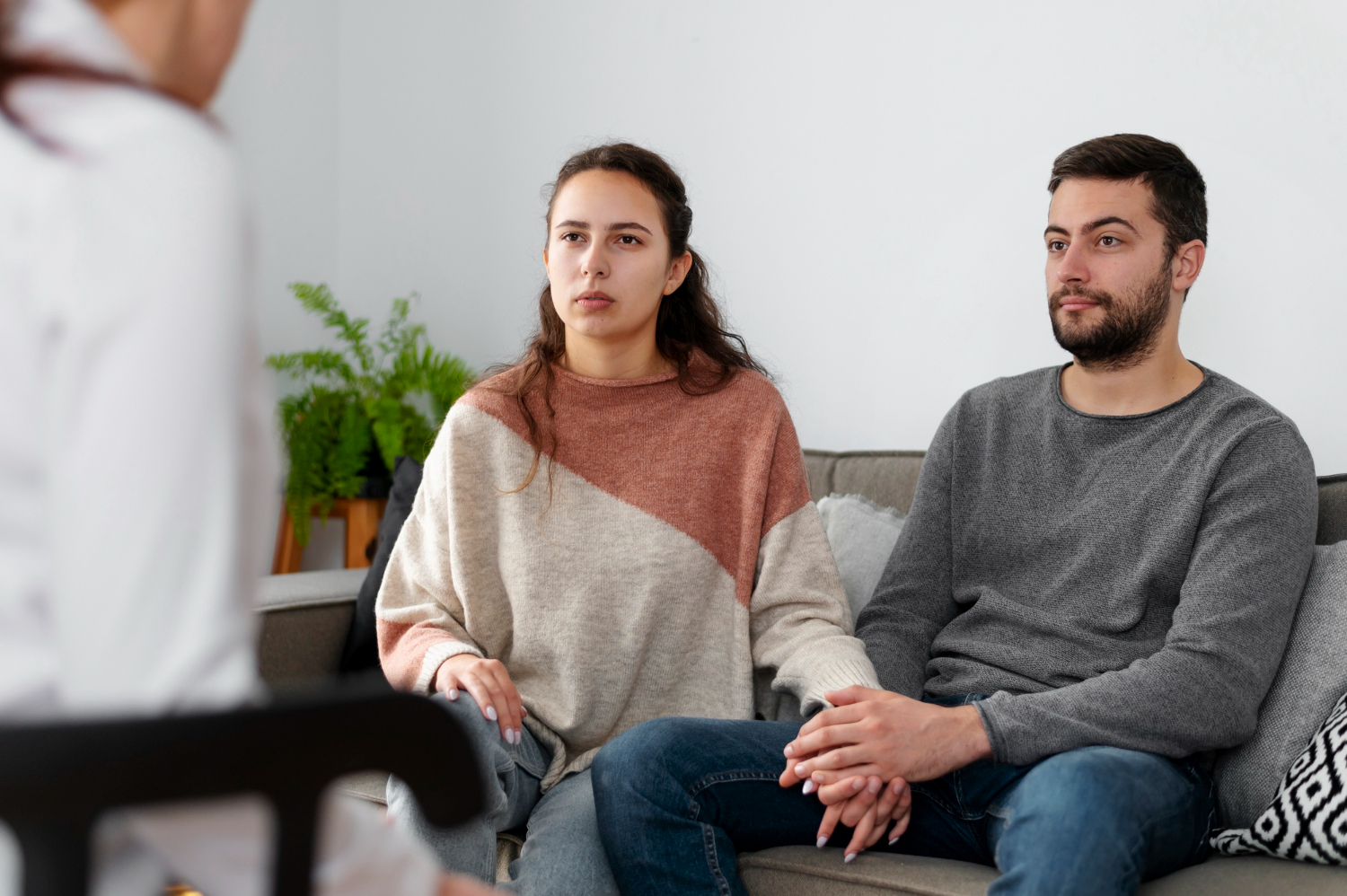I’ve walked the halls of our PHP program in Middletown for years. I’ve watched new faces arrive—shaky, hopeful, fractured—and I’ve watched those faces change over time. But the ones who stay with me in memory are the alumni who return. Not because everything went wrong. But because something went quiet. Because the victories felt hollow. Because the fight got lonely.
When an alum walks back through those doors, it isn’t disgrace. It’s a sign. A second season in partial hospitalization program (PHP) isn’t regression—it’s recommitment. This is what I see when they come back, and why I believe a second season can change everything. (By the way, we offer PHP services not just here in Middletown, but support for those coming in West Chester, Ohio and in Dayton, Ohio—so if distance is a worry, know you’re not alone.)
The Silence That Follows Success
Let’s be honest: success has edges.
You stay clean or sober for years. You hold a job. You build relationships. You develop habits. People say you’re “in recovery.” But inside, you feel a distance. Things lose color. The emotional intensity that once screamed starts to fade. You go through motions. You keep showing up, but in pieces.
That’s when I see alumni coming back. Not because they fell off the wagon with a dramatic relapse. Because their spirit got muffled in the steady hum of “doing good.” The call to return isn’t failure—it’s longing. A longing for reconnection, for meaning, for what was lost in the mechanics of recovery.
Renewal Trumps Reinvention
In their first PHP season, alumni often rebuild from crisis. They stabilize. They learn tools. They shift identity from “broken” to “recovering.” They map out goals. They leave.
But life changes. Trauma resurfaces. Relationships shift. Careers advance or plateau. Roles transform: parenthood, aging, marriage, loss, transition. The structure that once held might feel thin now.
A second season in PHP offers something different. It isn’t “doing the same work over again.” It’s deeper work. It’s saying:
- I don’t want to drift.
- I want to evolve.
- I need more clarity.
- I want to re-engage with life, not just keep surviving.
When alumni return, the answer isn’t “start over.” It’s “level up.”

What I Notice First in Returning Alumni
Re-awakened Eyes
When someone returns, their eyes often shift first. The dull noticeability lifts. The gaze becomes curious again—engaged, searching. You see someone wanting more than stability: wanting life.
Nervous Energy & Hesitation
There’s tension. They step in as both veteran and newcomer—knowing too much, fearing what they left behind. They carry both strength and grief.
More Precise Hurts
They articulate pain differently. Not “I’m broken.” More like, I lost something. This plateau hurts. I used to feel alive, now I’m numb. The language is richer, more nuanced.
Commitment That Surprises Themselves
Some come in thinking they just need a refresher. Then they commit wholeheartedly, day after day, surprising themselves with how much they want this second chance.
Regrowth From Roots
I watch them reclaim parts they shelved: creativity, connection, voice, presence. The edges of their soul become part of the recovery again—not collateral damage to sobriety.
How the Second PHP Season Actually Works (No Vague Promises)
The second season isn’t the first season with bigger fonts. It’s adapted. Evolved. Refined. Here’s how it often looks:
- New assessments focused on current life – We don’t retake every old test. We measure what’s changed—stressors, relationships, emotional gaps.
- Tiered therapeutic themes – Instead of general group therapy, there are “advanced focus groups” on relational repair, purpose work, meaning, identity.
- Rotating clinician perspectives – Sometimes alumni shift therapists or add a fresh clinician to break old dynamics and invite new insight.
- Leadership roles in community – Alumni may mentor newcomers or assist groups. Teaching consolidates healing.
- Intentional boundary mapping – Work around “how much I can give,” “when I say no,” integrating recovery with life roles.
- Gradual tapering & future planning – As the season ends, you don’t get dumped back into life. You build a bridge to next level care (IOP, outpatient, support networks).
Structure, yes—but new structure. Not the same ladder. A second season is about depth, not déjà vu.
Where It Gets Hard—and Why That’s a Good Sign
Returning isn’t easy. It can feel more threatening than the first time. Because you’ve already seen the cracks. Because you remember how hard it got. Because you’ve invested. The walls are thicker now. The self-protection is more sophisticated.
You might feel:
- Shame: How could I need to come back?
- Resistance: I’ll just tell myself I’m done.
- Comparison: Why does that new client heal so quickly?
- Impatience: I shouldn’t be this stuck now.
- Fear of failure: What if this is just another plateau?
When those show up, they’re not enemies. They’re indicators. They point to places where growth is ready—but blocked. I tell alumni: If it doesn’t feel harder, it’s probably more superficial. Real work stirs the edges.
When Alumni Return, I See What Needs to Be Held This Time
| Need | What Often Didn’t Get Held the First Time | What I Hold for Them in Season Two |
|---|---|---|
| Identity | You healed by subtraction—cutting what didn’t work | Now you heal by addition—finding what you want to grow toward |
| Power | Early recovery demands surrender; identity recedes | We support rebuilding agency, voice, choice |
| Relationship repair | Trust boundaries often stayed broken | Deeper relational work, reconciliation, honest repair |
| Spiritual & existential noise | You had urgency to survive; big questions got postponed | We circle back to meaning, legacy, belief |
| Role transitions | You stopped substances; you didn’t always evolve life roles | We address career, parenting, aging, belonging |
I don’t expect you to reinvent yourself. I counsel you to re-engage what you left behind.
FAQs: Returning to PHP for Long-Term Alumni
1. Can I return to PHP after years away?
Yes. Most of our alumni return after years—some after a decade. Your return is welcome, whether you’ve drifted slowly or taken hard detours.
2. Will it feel redundant or repetitive?
If you choose a program that adapts to your current context, it won’t be redundant. At River Rocks, we tailor your second season so your plate isn’t a re-run. We lean forward, not recycle.
3. Is it admitting failure or weakness?
Not at all. It’s strength. Recognizing that what used to work doesn’t always sustain. Choosing to return is a vote for deeper life, not evidence you didn’t care enough.
4. How long does a second-season PHP last?
Typically 4–8 weeks, though some stay longer if transition or integration demands more time. It’s co-designed with you—not rigid.
5. What’s the difference between this and just doing more outpatient therapy?
Outpatient is lighter structure. You go home at night, but you return to unguarded life. A second-season PHP gives you daytime sanctuary, community, support when life’s pressures are still real, but you don’t have to check out completely.
What I Want You to Know If You’re Reading This
If you’re stuck. If you feel like you’ve plateaued. If the edge of recovery now feels muted or drained.
I want you to know that coming back isn’t shame—it’s reconnection. Returning is not a rollback—it’s a reset with more grace, more wisdom, more nuance than before.
The version of you that shows up now carries different wounds, different dreams. The second season is not for the one you were; it’s for the one you’re becoming.
If you find yourself whispering, “Maybe I need more”—I see you. I believe you. There’s power in that whisper.
You Don’t Have to Stay Stuck in Neutral. Your Next Season Begins When You Choose It.
Call (888) 905‑6281 to learn more about our partial hospitalization program services in Middletown, Ohio.
Let me know if you’d like shorter versions, alumni‑facing sequels, or an email campaign built from this.

